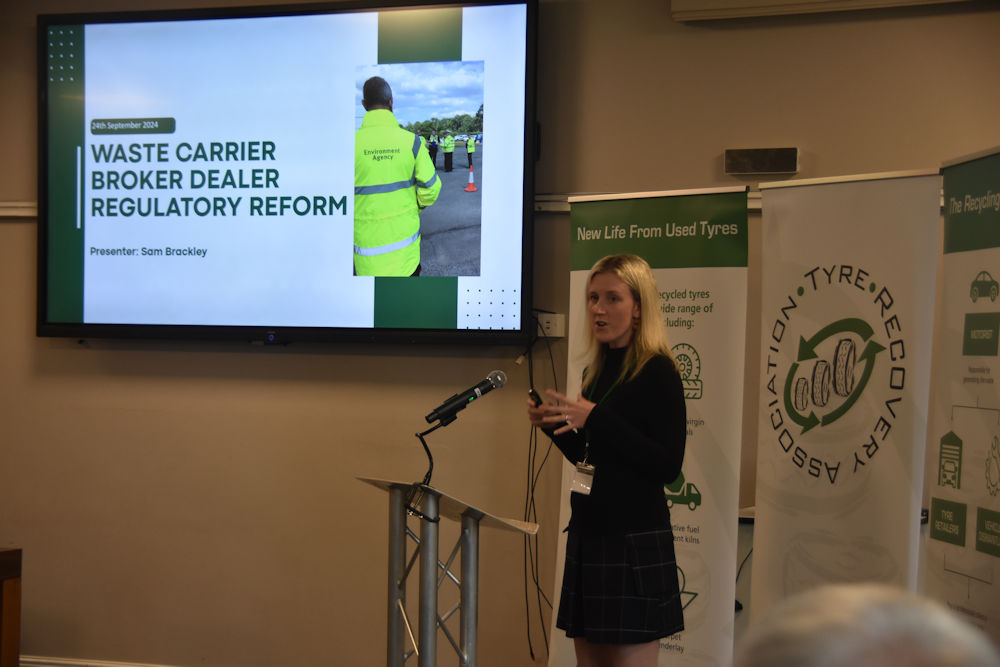A wind of change blew through the TRA Forum this year, news changes impacting everyone in the chain, and a fresh attitude to cooperation across the tyre sector
The presentations at the TRA event included news of waste tracking and a change to how Carriers, Brokers and Dealers are to be regulated.
The keynote speaker at the Forum was George Eustice, Environment Secretary from 2019 to 2022, having been involved in DEFRA since 2013, in various roles.
Eustice opened his presentation with the statement; “There is a weakness in the regulatory system…. That can’t be right.” He added; “DEFRA is aware of the levels of waste crime from T8s through to organised crime. Over the years, a package of recommendations have been implemented to address waste crime.”
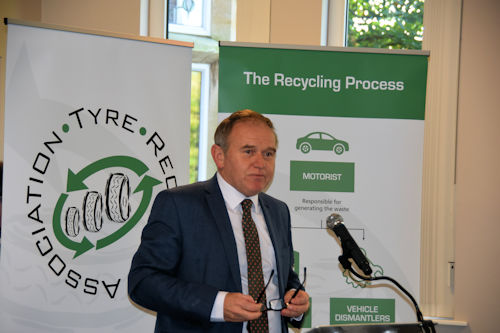
However, he outlined what the Forum has been told many times by the Environment Agency, that the T8 has no fee attached, and as there is no revenue, there is no funding to investigate unless evidence of a breach of the rules has been raised.
The emphasis of enforcement has been on ensuring those permitted sites are in compliance with their permits.
There was some discussion about the need to pyrolysis, and the need to make access to recycling simpler.
The audience was polite, no hecklers pointed out the obvious, though there was some private discussion as to why in 14 years nothing had been done to rectify the situation. Which, as later speakers were to show, was not quite the reality of the situation.
The first understanding of changes to come were presented by Chris Brain, Digital Waste Tracking Service Owner at the EA.
Bain outlines the issues the EA face in managing waste data under the current system. Paper-based data is difficult to collate, it is often not completed, or completed improperly. Officers looking at the paper-based data may have to cross reference with multiple databases, both digital and paper-based. This takes up a great deal of time and delays the point at which an investigation might be triggered.
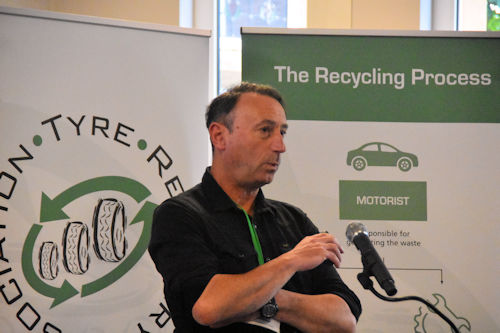
The waste tracking system will be a digital process coming from a comprehensive review of the Waste Transfer notes, Hazardous Waste Carrier Note and Annex VII requirements. It will bring all the “paperwork under one digital platform. This will give the EA data in near real time. The biggest benefit will be in helping the EA understand where to intervene.
The TRA was told that the change comes under the Waste Regulatory Reform Programme designed to tackle waste crime. The Go Live date is expected to be April 2025. Everyone in the chain will be expected to comply with the new regulations and reporting system. In theory, tyres entering collection outside the system, will be blocked from entering the system further down the chain – there will be no market for them.
This change was on its way under George Eustice’s oversight, so this mitigated comments about nothing having been done.
However, there is more change to come. And in another presentation, Sam Brackley, Senior Advisor, CBD Reg Reform Project Technical Lead, EA, outlined the coming changes in the way Carriers/Brokers and Dealers were to be regulated.
Brackley advised that the current two-tier system was going to be replaced, it was unmanageable and had flaws. There were currently some 229,000 Tier One carriers who paid no fees, and some 130,000 Tier Two Carriers paying £154 every three years for their licence. That was £154 per business. So, the local operator with one or two trucks paid the same fees as a national carrier with maybe a couple of hundred trucks. This was to change, and businesses would pay fees relative to their size. Currently, the EA did not know who amongst these Tier Two operators were Carriers, Broker or Dealers. Tier One carriers pay no fees, so the familiar lack of funds leads to minimal investigation. That was a system not fit for purpose according to Brackley.
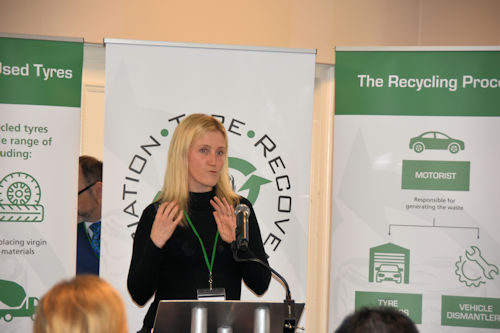
The new system will see the Carriers, Brokers and Dealers brought into the Environmental Permitting Regulations. They will all have to employ someone who is Technically Competent to manage operations and complete the transfer paperwork (QV Waste Tracking Requirements). This is a change from allowing the use of a TC Consultant, who may or may not be completely familiar with the materials or the markets.
The EA will have more regulatory tools and will be able to step in to suspend or revoke Permits. This, Brackley believes will bring people into line, because if a Permit is suspended or revoked, then that removes the ability of his customers to buy and sell through that operator, as the waste ill be tracked and if a link in the chain is removed, the waste cannot move past that broken link and the business will have to go to an alternate Permitted operator.
There will be three areas of Permitting – Controllers – these will be the Brokers and Dealers; Transporters, these will be the Carriers; and Controller Transporters who do both. These will be further broken down to cover those who import and export in each field.
The CIWM is working with the EA to establish training for the employed Technical Competence staff. Failure to have an employed TC will see a suspension or revocation of Permits.
The question was asked about how the EA would handle Brokers or Dealers not based in the UK. Brackley admitted that this was problematical, but in essence, if the overseas Broker or Dealer could not supply the correct Waste Tracking details, then the UK supplier would be held at fault for supplying outside the accountable chain.
In the meantime, the European Union is developing its own waste tracking system, which will be Pan-European and will be centralised in Brussels. In theory, there should be no issues with non-compliant Brokers and Dealers in Europe.
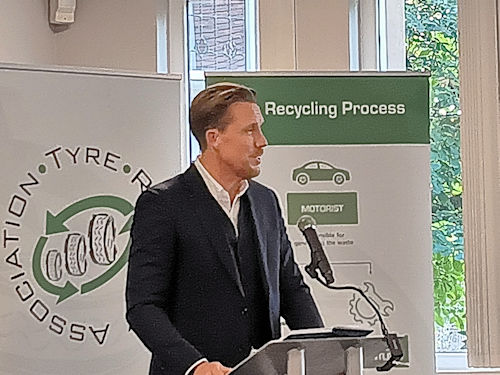
The TRA had another key contribution, which came from Rajiv Budhraja, Director General India’s Automotive Tyre Manufacturer’s Association. Budhraja has been at the forefront in pushing for reform of India’s tyre recycling sector, though has stepped away from calling for a complete ban on waste tyre imports, to a position where he called for cooperation between the authorities in the UK and India to resolve the problem of waste tyres going to pyrolysis. One solution which was mooted was the ban on the export of whole tyres, but he stopped short of calling for shred only exports.
The TRA Forum was concluded by Darren Lindsey, Chief Executive, British Tyre Manufacturers Association. In a well-prepared discussion, he called for co-operation between everyone in the industry, and argues that there was a failure at government level to ensure enforcement and to encourage recycling. That was reiterated by the National Tyre Dealers Association’s Stephan Hey, who went further asking for better legislation and incentivisation to help the recycling industry grow and help build a recycling sector that was an asset to the UK. Lindsay concluded with a question. One rarely raised openly at TRA Forums, “Is there a need for Extended Producer Responsibility/ It has its problems, but it might be better than what we currently have.”

















